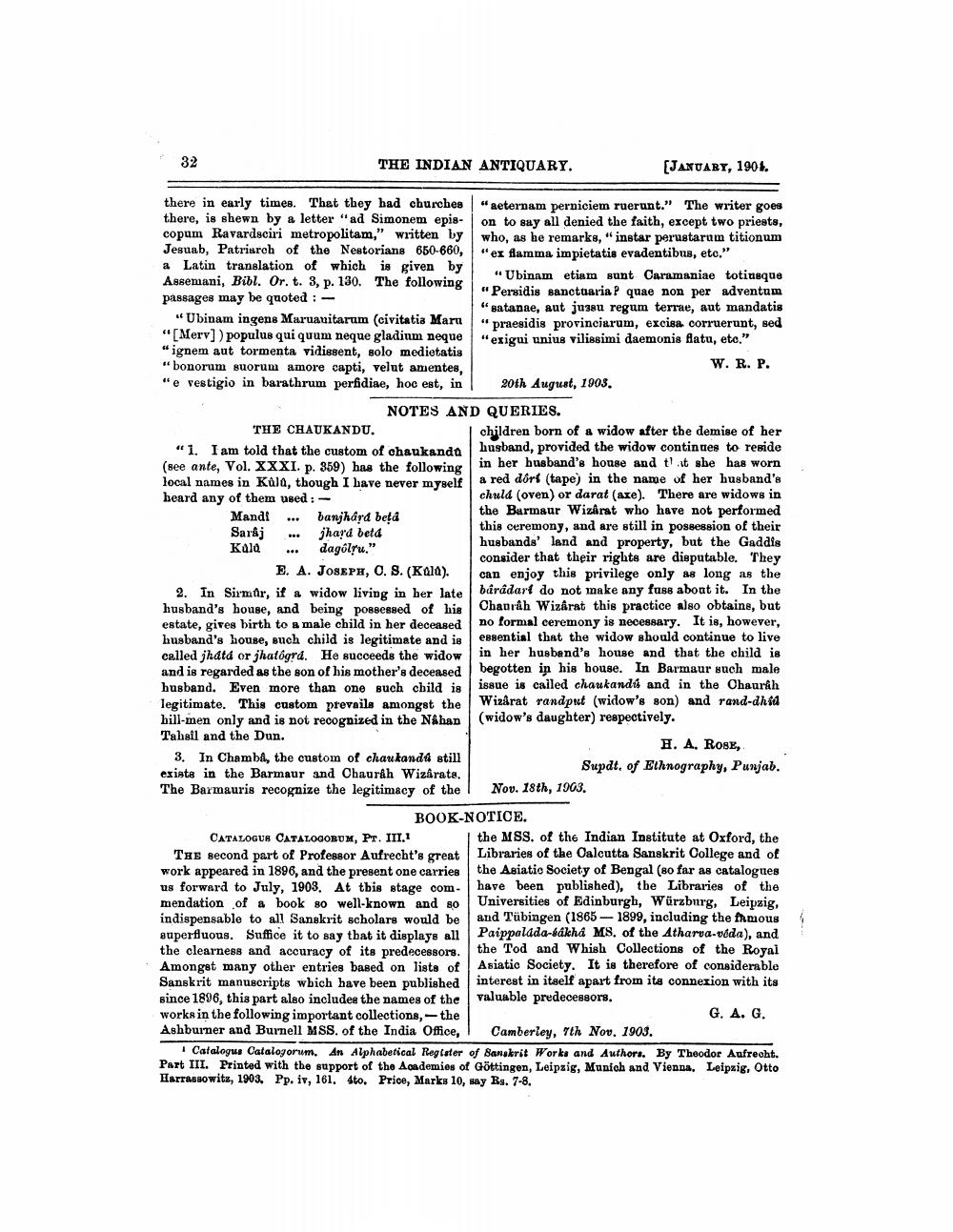________________
32
THE INDIAN ANTIQUARY.
(JANUARY, 1901.
there in early times. That they had churches "aeternam perniciem ruerunt." The writer goes thore, is shewn by a letter "ad Simonem epis- on to say all denied the faith, except two priests, copum Ravardsciri metropolitam," written by who, as he remarks, "instar perustarum titionum Jeguab, Patriarch of the Nestorians 650-660, "ex flamma impietatis evadentibus, eto." a Latin translation of which is given by
Ubinam etiam sunt Caramaniae totiusque Assemani, Bibl. Or. t. 3, p. 130. The following
"Persidis sanctuaria? quae non per adventum passages may be quoted :
"satanae, aut jussu regum terrae, aut mandatis Ubinam ingens Maruanitarum (civitatia Maru " praesidis provinciarum, excisa corruerunt, sed "Mery]) populus qui quum neque gladium neque "exigui unius vilissimi daemonis Batu, etc." "ignem aut tormenta vidissent, solo medietatis "bonorum suorum amore capti, velut amentes,
W. R. P. "e vestigio in barathrum perfidiae, hoc est, in 20th August, 1903.
NOTES AND QUERIES. THE CHAUKANDU.
children born of a widow after the demise of her "1. I am told that the custom of chaukanda
husband, provided the widow continues to reside (see ante, Vol. XXXI. p. 359) has the following
in her husband's house and that she has worn local names in Kala, though I have never myself
a red dort (tape) in the name of her husband's heard any of them used :
chrld (oven) or darat (axe). There are widows in Mandt ... banjhard beta
the Burmaur Wizarat who have not performed Saraj ... jhard beta
this ceremony, and are still in possession of their
husbands' land and property, but the Gaddis Kula ... dagólru."
consider that their rights are disputable. They E. A. JOSEPH, O. S. (Kald). can enjoy this privilege only as long as the 2. In Sirmir, if a widow living in her late búradart do not make any fuse about it. In the husband's house, and being possessed of his
Chaurah Wizarat this practice also obtaine, but estate, gives birth to a male child in her deceased no formal ceremony is necessary. It is, however, husband's house, such child is legitimate and is essential that the widow should continue to live called jhatd or jhatogrd. He succeeds the widow in her husband's house and that the child is and is regarded as the son of his mother's deceased
begotten in his house. In Barmaur such male husband. Even more than one such child is
issue is cailed chaukandi and in the Chaurih legitimate. This custom prevails amongst the
Wizarat randprt (widow's son) and rand-dhid bill-men only and is not recognized in the Náhad
(widow's daughter) respectively. Tahsil and the Dun.
H. A. Rose, 3. In Chamba, the custom of chaukandt still
Supdt. of Ethnography, Punjab. exists in the Barmaur and Chaurah Wizarata. The Barmauris recognize the legitimacy of the Nov. 18th, 1963.
BOOK-NOTICE. CATALOGUR CATALOGORUM, Pt. IIT.
the MSS. of the Indian Institute at Oxford, the The second part of Professor Aufrecht's great Libraries of the Calcutta Sanskrit College and of work appeared in 1896, and the present one carries the Asiatic Society of Bengal (80 far as catalogues us forward to July, 1903. At this stage com have been published), the Libraries of the mendation of a book 80 well-known and so Universities of Edinburgh, Würzburg, Leipzig, indispensable to all Sanskrit scholars would be
and Tübingen (1865-1899, including the frmous superfluous. Suffice it to say that it displays all
Paippalada-sakha Ms. of the Atharva-voda), and the clearness and accuracy of its predecessors. the Tod and Whish Collections of the Royal Amongst many other entries based on lists of
Asiatic Society. It is therefore of considerable Sanskrit manuscripts wbich have been published interest in itself apart from its connexion with its since 1896, this part also includes the names of the valuable predecessors. works in the following important collections, the
G. A. G. Ashburner and Burnell MSS. of the India Office, Camberley, Yth Nov. 1903.
Catalogue Catalogorum. An Alphabetical Register of Sanskrit Works and Authors. By Theodor Aufrecht. Part III. Printed with the support of the Academies of Göttingen, Leipzig, Muntoh and Vienna. Leipzig, Otto Harrassowitz, 1903. Pp. iv, 161, 4to. Price, Marks 10, say Rs. 7-8.




